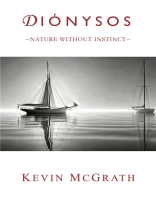Kevin Mc Grath’s Diónysos: Nature Without Instinct is more than just a book; it is an encounter that unfolds in the liminal spaces between instinct and intellect, order and chaos, life and death. Like the masked dancer referenced in its title, this work moves with fluid grace, slipping between myth and philosophy, poetry and psychology, guiding its readers into the deep, uncharted waters of the human psyche.
Dionysos, the wild god of revelry and ruin, serves not only as a mythological figure here but also as a living presence, a force that both dismantles and remakes. Mc Grath invites us to consider how this restless energy flows through our lives, how the impulse toward destruction also fuels the impulse toward creation, and how the plowed field must first be broken before a new crop can rise. His lyrical and rigorous prose guides us through the landscapes of classical literature and contemporary thought, demonstrating that the Dionysian force is not merely an artifact of ancient religion but a vital and necessary aspect of being alive.
Like the finest teachers and preachers, Mc Grath neither provides us with easy answers nor attempts to tame the wildness he describes. Instead, he invites us into the mystery itself, encouraging us to engage with paradox, recognize the sacred within disruption, and perhaps listen for God’s voice in the ecstatic, the unpredictable, and the untamed.
Reading Dionysos: Nature Without Instinct reminds us that our yearning for stability can sometimes clash with the divine invitation to transformation. This book does not permit us to rest; instead, it compels us toward movement- toward deeper truths, toward the trembling edge of our understanding, and toward a perspective that is both ancient and wholly new.












